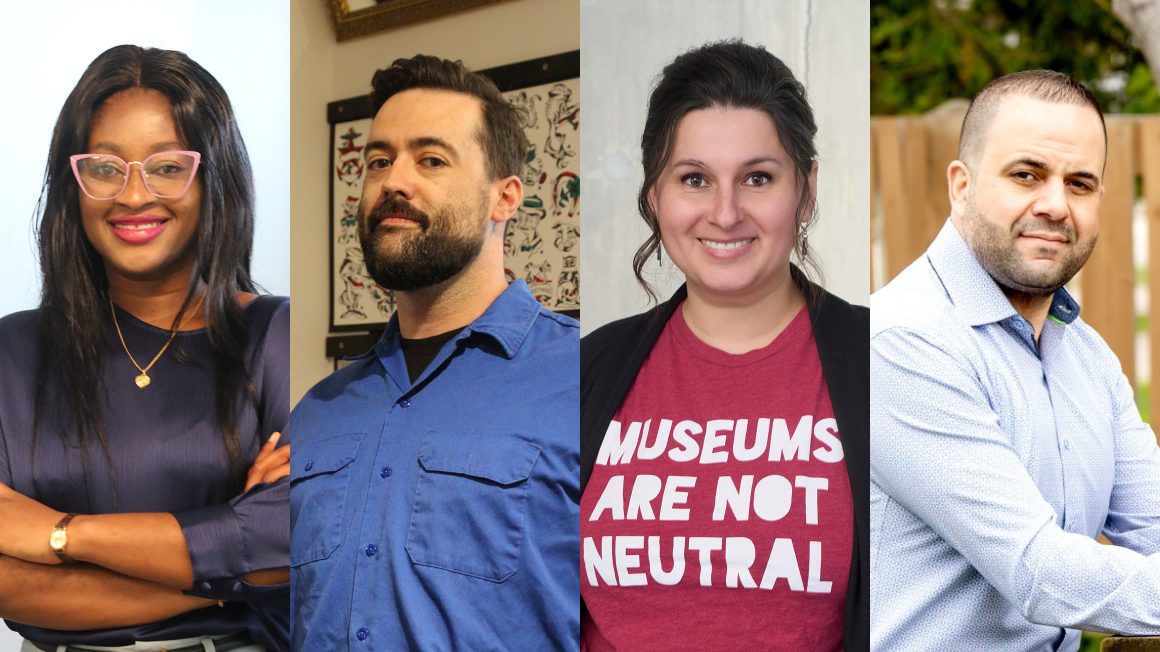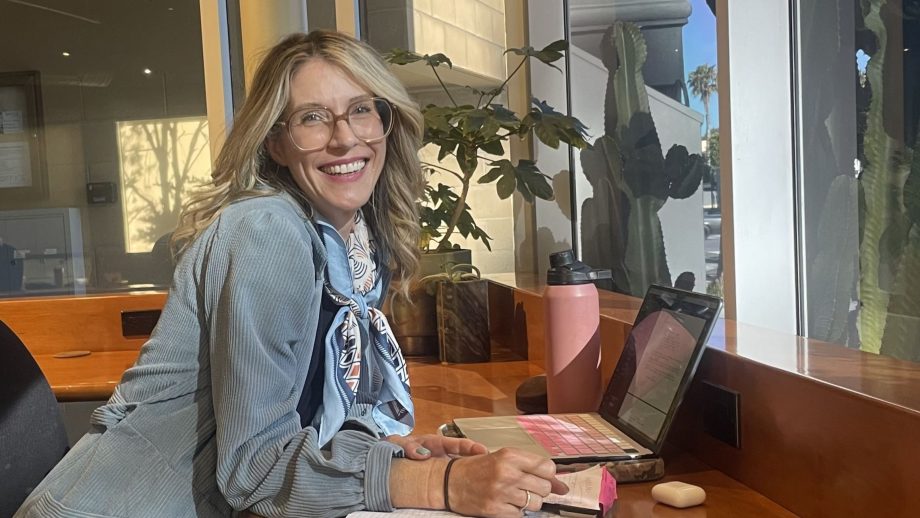TED Talks are designed to inspire. These short, powerful presentations aim to ignite conversation and share ideas worth spreading. Four remarkable speakers, each with a UWinnipeg connection, will take the local TEDx Winnipeg stage and hope their ideas travel the globe.
On May 29, alumna Dorota Blumczynska (BA 05, PACE 07), UWinnipeg students Don Ritson and Chioma Onyekpere (PACE 25), and faculty member Izzeddin Hawamda, will speak at the 15th Annual TEDx Winnipeg. Their talks will cover a wide range of topics – from the significance of tattoo artistry to ethical artificial intelligence, to the power of storytelling, and the evolving role of museums in truth, reconciliation, and healing.
Dorota Blumczynska (BA 05, PACE 07)
Dorota Blumczynska, a lifelong learner and passionate storyteller, stepped into her role as CEO of the Manitoba Museum four years ago with a business degree, leadership experience, and a deep belief in the power of storytelling. “Storytelling builds relationships and trust,” she said, a theme central to her TED Talk, Museums must prioritize truth, reconciliation, and social justice.
To Dorota, the Manitoba Museum is a “library of stories,” housing nearly 3 million artifacts and specimens spanning 500 million years. But she believes museums must evolve beyond preserving the past—they must help shape a more just and inclusive future.
We work hard for stories to be narrated by the people who have lived them.
Dorota Blumczyska, CEO, Manitoba Museum
At TEDx Winnipeg, Dorota will highlight how museums are shifting their responsibilities. “We work hard for stories to be narrated by the people who have lived them,” she said. “For them to honour truth and propel us into action.” She emphasizes that meaningful change often begins in discomfort, and that communities and visitors now play a powerful role in influencing museum practices.
“Museums are being called to be allies. Because of community influence, institutions like the Manitoba Museum are transforming their curatorial approaches.” This includes moving toward co-operative storytelling, where communities help shape exhibits and narratives.
Speaking at TEDx was a dream for Dorota, driven by her urgency for museums to confront their complex and often painful histories. “We will never be able to undo the past, but we can certainly begin to advance justice for the past and try to repair the missteps that were taken by museums in the early days.”
Dorota wants audiences to see museums not just as keepers of history, but as active participants in today’s social landscape. “Museums are very much in the contemporary space. When we work in good ways with communities, they can play a vital role in shaping a more just and inclusive future.”
Chioma Onyekpere (PACE 25)
Chioma Onyekpere (PACE 25), a senior software engineer from Nigeria, came to UWinnipeg PACE to deepen her understanding of artificial intelligence (AI).
“I wanted to explore data not just in coding or building websites, but with predictive analysis and AI,” said Chioma. Her talk, Biased AI is Already Deciding Your Future – Ensuring ethical AI by addressing bias in predictive models, stems directly from her studies and passion for ethical technology.
Chioma praises the PACE program for its practical approach to data. “It seems very simple, but it’s not. AI is something everyone needs to know about,” said Chioma. She describes AI as a system that uses data to detect patterns and make predictions – an increasingly integral part of daily life since the launch of tools such as ChatGPT in 2022.
“AI is in our lives. We’ve got to the point that it is almost impossible to get it out of our day to day.” This inspired Chioma to speak out, aiming to encourage public’s understanding AI and ability to challenge the decision-makers around AI.
Instead of being afraid of AI, we should look for ways to make AI better.
Chioma Onyekpere
Chioma understands there are concerns about AI but suggests a proactive approach. “There is a lot of propaganda about AI – some of it is true – but instead of being afraid, we should look for ways to make AI better.”
Chioma hopes that by educating her audience about AI, they will be able to influence change and hold accountable, those who build and develop AI. “I just want people to keep questioning AI because it’s shaping our lives. Even if it’s not direct – it’s shaping the things that we do.”
Don Ritson
Business owner and tattoo artist Don Ritson has spent 18 years perfecting the art of tattooing. He specializes in Western Traditional Motif tattoos, which feature thick, clean lines of black, with spots of red.
As Don’s technical expertise in tattooing evolved, so did his interest in the history of tattoos, particularly Japanese tattoo history. These interests, combined with the desire to communicate in Japanese with friends, prompted Don to begin his university journey in 2022.
“The catalyst for going to university was learning Japanese,” said Don. “I wanted to ask questions and have more in-depth conversations with my friends.” After three years in the classroom, Don is taking full advantage of all UWinnipeg has to offer. He is working towards a double major in East Asian Languages and Culture, and history.
“I’m following my interests, and it’s also something I’ve always wanted to do,” said Don. He hopes his degree will build his credibility in the academia world, one that supplements his existing reputation in the tattoo community.
During his TEDx talk, Don is going to explore the deeper meanings of tattooing. In particular the relationship between the physical and metaphysical experience of tattoos. “A few years ago, a client told me about a new trend among wealthy customers who are opting to get tattoos under anesthesia,” said Don. This concept stuck and is the basis of his talk.
“Not everything about tattooing is fun,” said Don. “It hurts, it takes time, it has to heal. But there is also a social element involved. Tattoos can force clients to get out of their comfort zone. It can challenge them to examine things like permanence and what the body is capable of. When people are getting tattoos anesthetized, they circumvent the entire process.”
Don says tattoos have become ubiquitous. He hopes to give the TEDx audience an insider perspective and challenge them to think about tattooing in a different way.
Dr. Izzeddin Hawamda
Dr. Izzeddin Hawamda, an adjunct faculty member in the Anthropology Department, will give a talk titled Exploring identity and belonging through the lens of statelessness.
Dr. Hawamda will draw on his own life growing up in a rural village near Nabulas in the West Bank to highlight the emotional and social complexities of being shaped by conflict, and the psychological toll it takes on individuals and communities.
“I want to share the human face of the Palestinian story,” said Dr. Hawamda. “As someone who has lived through the realities of statelessness and conflict, I believe in the power of storytelling to create bridges between people, cultures, and communities. I hope by sharing stories of my land, communities and struggle, the audience will walk away with a deeper understanding of the human impact of life under occupation and the importance of seeing each other beyond political narratives.”
Read more about TEDx Winnipeg and get inspired by the 13 speakers lined up to share their ideas.


